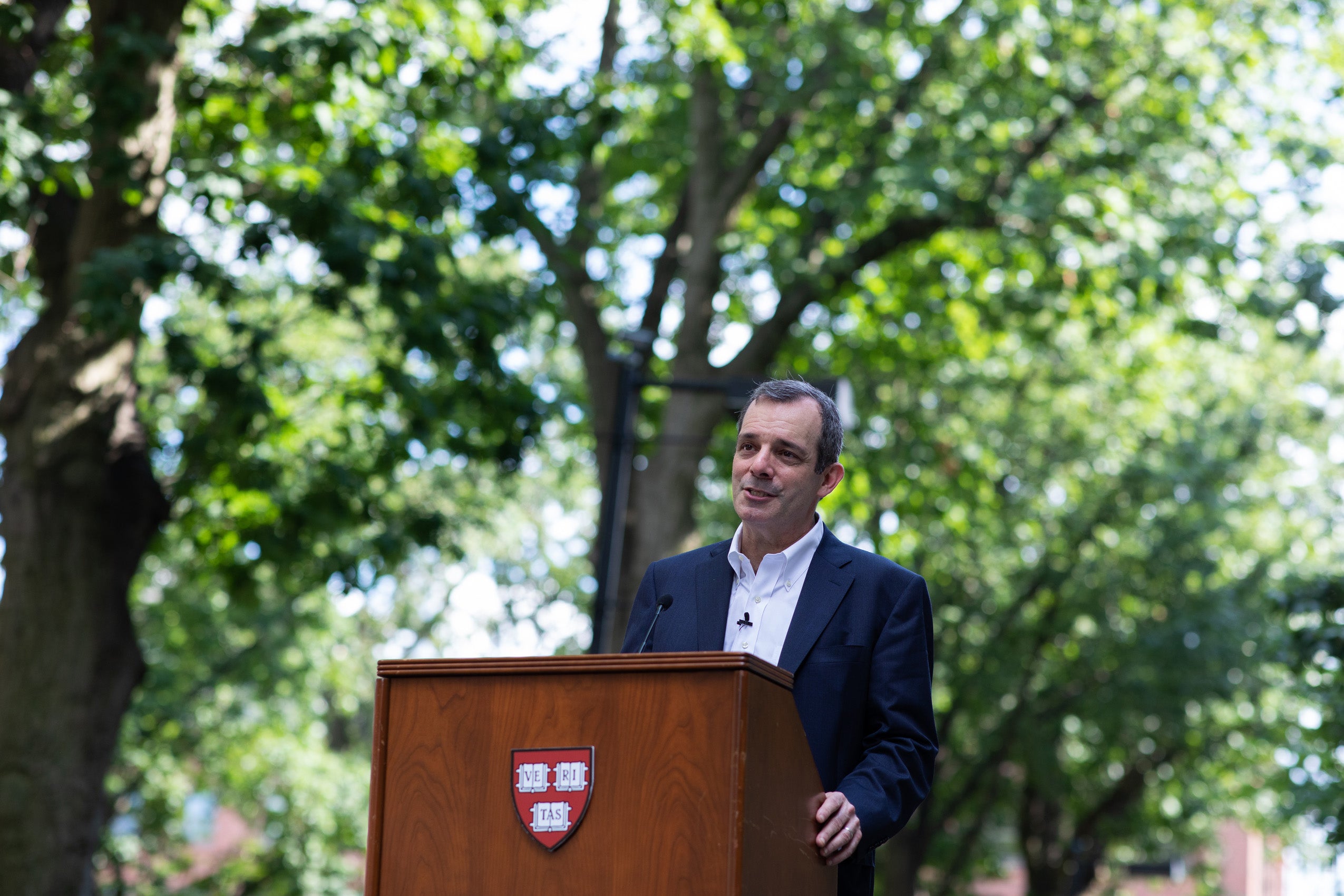In a welcoming address during virtual orientation Thursday, Harvard Law School Dean John F. Manning ’85 predicted that many incoming students would use their legal education to help confront two of the most pressing challenges facing the United States and the world today: the COVID-19 pandemic and the longstanding fight against racism, racial inequality, and abuse of power which was tragically highlighted again by the killings of George Floyd and other Black individuals across the nation.
Standing outside Langdell Hall on a bright summer afternoon, Manning, the Morgan and Helen Chu Dean and Professor of Law, thanked the new J.D., LL.M., and S.J.D. candidates—all of whom were watching remotely due to the pandemic—for choosing to begin their legal education this year, despite the disruptions caused by COVID-19. “You are starting law school in the midst of a global pandemic that’s fundamentally altered the way all of us live, work, study and interact,” Manning said. “It would have been easy for you to decide that this wasn’t the year to start a new career. But we’re happy you’re here and so happy to welcome you to HLS.”
He added: “It’s a really important time for you to be doing what you’re doing. In a constitutional democracy that’s dedicated to equal justice and the rule of law, the law and the legal system play a central role in all that we do, in making progress and in solving problems that badly need solving. And lawyers—particularly, you, the next generation of lawyers—will have a lot to say about whether and how we can accomplish these vital goals.”
The law and lawyers can and must play their part in eradicating evils that have for too long been part of the fabric of this nation’s history.
Citing the COVID-19 pandemic and the fight against racial inequity, and the many crucial legal questions they each raise, Manning told the future Harvard Law graduates that they would “take their place and play their part in both of these areas of urgent need.”
“With its tragic disparate impact on communities of color, this pandemic has laid bare deep inequalities in our society,” he said. “And as this nation has struggled to stem the spread of this deadly illness, it has also raised profound questions of constitutional law.”
Among them: Which government—federal and state—has proper authority to combat “a disease that knows no boundaries?” And where do state and federal officials locate their authority to prescribe public health measures such as mask-wearing and quarantines, that restrict individual freedoms to serve the common good? “None of these questions can be answered without law or lawyers,” the dean reminded the audience.
“Lawyers also have a key role to play in the struggle for racial equality,” he said. “The killing of George Floyd and other Black individuals across this nation has again rightly focused the nation’s attention on racism and abuse of power. Again, the law and lawyers can and must play their part in eradicating evils that have for too long been part of the fabric of this nation’s history.”
From the “rules, policies, and structures governing voting, housing, health care” to the causes of mass incarceration, which disproportionately impacts communities of color, Manning cited a host of legal questions that are central to efforts to promote “progress toward the elusive goal of equal justice under law.”
The dean also noted that students would be able to begin confronting these questions while they’re here at HLS—in class, in lectures, in their student organizations, and by serving clients in need of legal representation.
“Our 34 clinics and 11 student practice organizations will give you the chance to represent marginalized and vulnerable individuals who face fines or imprisonment; loss of benefits or shelter; discrimination in employment, health care, or lending; food insecurity; obstacles to effective public education; and so much more,” he said. “In the past 15 years, our students have contributed more than four million hours of pro bono work, both through the direct representation of individuals who need our help and through impact litigation that helps bring about much needed systemic change.”
The dean reminded students that they would soon be joining a long line of graduates who have fought for and effected positive change, both in the United States and abroad.
“Harvard Law School is a place that produces great lawyers and leaders, year after year, field after field, and generation after generation,” Manning said. “In this moment of great challenge, where fundamental change is so badly needed, I know that many of you will take up this mantle of leadership. And that’s part of why I feel moved that you’ve decided to begin your studies now. There are large problems to be solved, and many of you will play an integral role in solving them.”
